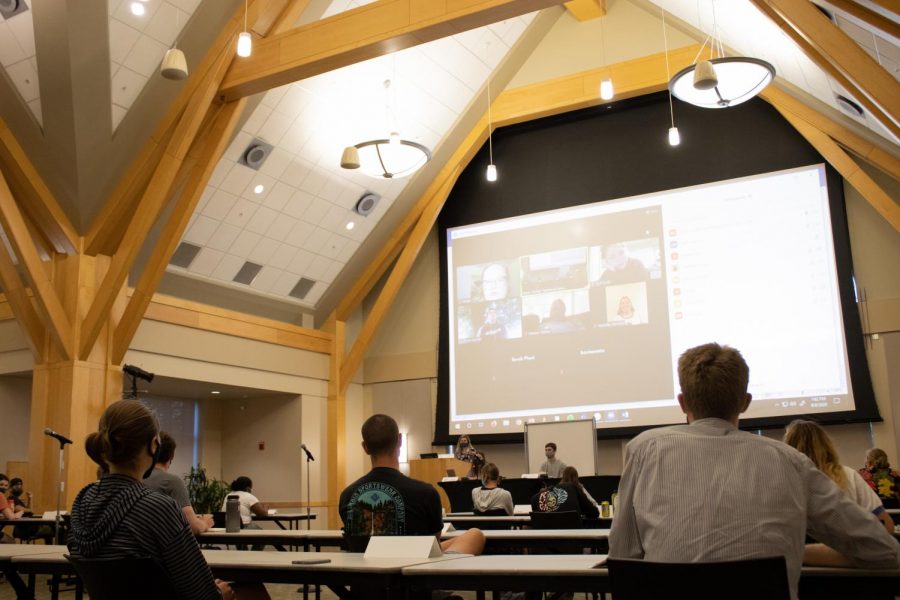SGA affirms support for the Cynic following admin changes to student media oversight
SGA council members socially distance in their first in person meeting of the year, Sept. 8.
UVM’s Student Government Association affirmed its support for the Cynic’s autonomy following changes from the University to the student newspaper’s oversight.
Senior Sawyer Loftus, Editor-In-Chief of the Vermont Cynic, spoke at the UVM Student Government Association’s Nov. 17 virtual meeting to address his concerns over the University’s decision to hire Jenny Grosvenor, a professor from the College of Arts and Sciences, as the interim student media adviser.
“At this point, I have pretty limited faith in the University system,” said Loftus. “I think that we’re really witnessing some interesting power trends and currents swift through the administration, particularly this semester.”
In a Cynic letter from the Editor-in-Chief published Sept. 22, Loftus said the Provost’s goal in hiring Grosvenor was to link extracurriculars with curriculum, thereby combining the Cynic with the Reporting, Documentary and Storytelling program within the College of Arts and Science.
SGA’s senate took a vote and agreed to support the Cynic in this conflict. SGA President Lana Al-Namee said it was important for SGA to advocate for a strong student voice on campus.
“We have to remember that this is a student run organization,” Al-Namee said. “And it makes the most sense to have student voices and have it be student led.”
Loftus said he was concerned that aligning the Cynic with the College of Arts and Sciences could threaten the newspaper’s independence and discourage students who are pursuing degrees outside of CAS from joining the paper.
Furthermore, Loftus said that Grosvenor threatened to withhold stipends granted to Cynic officers because they refused to meet with her.
In an Oct. 12 email to Loftus, Grosvenor stated: “Your appointment letter also states: ‘In the case that the following responsibilities are not met, the compensation may be waived at the discretion of the signers of this contract’… please know that this is in no way a threat to force a weekly meeting with you. I am simply stating the facts.”
Loftus said he and the other two students at the Cynic that are supposed to be paid have not received their stipends at all this semester. The revenue for their stipends comes out of Cynic ad sales, but has to be approved by the University.
Daphne Wells, director of student life, said the delay in stipend pay was due to logistical reasons involving paperwork issues.
“In terms of the stipends and what not, it wasn’t anything like people were holding it with malice, at least from our end,” Wells said. “The delay was essentially just the paperwork process.”
Both Loftus and Wells said that their perceptions of the situations differed due to their lack of communication with each other, but agreed that Grosvenor could not legally withhold stipends.
“In speaking with Director Wells tonight, It’s very clear that there’s a clear disconnect between top and bottom, and not even just varying levels of top across departments,” Loftus said.
Improving remote learning for students
After passing the resolution supporting the independence of student media, SGA passed another resolution supporting improvements to virtual accommodations for students.
Senator Izza Pipa, who co-authored the resolution, said both at-home and in-person students have been feeling unhappy and isolated with their options this semester.
“When students express issues, the first thing the University should do as the one collecting our money is listen and respond with appropriate support for students,” Pipa said.
The proposed virtual accommodations include offering Microsoft Teams tutorials and creating more flexible work schedules.
SGA funds program for first-generation students
As a final piece of legislation, SGA passed a bill allocating funds to TRiO Student Support Services, a national organization that provides low income families and first generation college students with micro-grants to pay for college expenses.
TRiO SSS typically receives federal grants, but that funding was cut this year. The resolution proposed in the Senate allocated $30,000 to TRiO SSS over the next two years.
Senator Maddie Henson said she felt it was extremely important for the organization to receive this funding to continue its services on campus.
“TRiO SSS is an incredibly important service to many students, BIPOC students, low income students, first generation students,” Henson said. “It offers an incredible amount of useful resources, but also incredible friendship.”
Cynic Editor-in-Chief Sawyer Loftus had zero involvement in the editing process for this article and has not read the article prior to publication.
Izzy Pipa is the assistant illustration’s editor for the Cynic.











Lea Terhune • Dec 2, 2020 at 10:22 am
Independent journalism. SGA, Cynic staff, KUTGW!